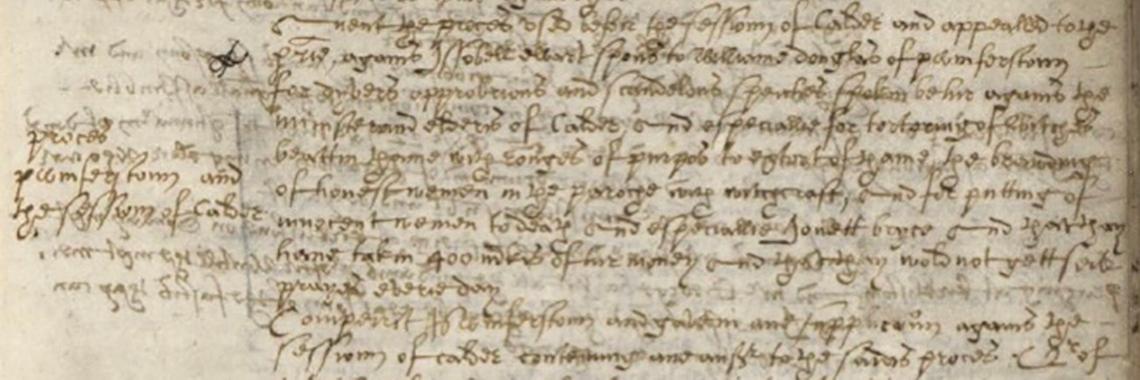In September 1644 Isobel Ewart appeared before the kirk session accused of ‘scolding and railing’ against them. She had dared to speak out about the witch hunt.
Isobel was wealthy noblewoman who was married to Sir William Douglas, Laird of Pumpherston. They lived at Pumpherston castle, close to Mid Calder kirk, and had seven children: a son James, who eventually became the Laird, and six daughters.
Isobel’s story shows us that although people at the time may have believed in witches, witchcraft, and the Devil, not all of them believed that the women who were being accused and punished were witches.
On the 22nd of September 1644 Isobel appeared before the kirk-session. They made serious accusations against her: that she had complained that the kirk session was making money from the witch hunt, and that she’d told people that the kirk was spreading rumours that she was a moyaner (a go-between) for the women who had been accused as witches.
Isobel denied the charges but did say that
‘the minister had done things behind people’s backs that he dare not say to their face’
Her case was escalated to Linlithgow Presbytery and in December 1644 her husband, Sir William, was there to defend her. At this hearing the kirk session ramped up their charges saying that Isobel was telling people that the kirk session was:
Torturing ‘witches’ and beating them with rungs {staffs} to try to extort confessions
Branding {tarnishing} honest women with witchcraft
Putting innocent women to death
And taking in money from the witches
This was incredibly brave of Isobel. By speaking out she risked being punished with humiliation in a sackcloth in front of the congregation or being chained in the stocks that were attached to a large plane tree in the centre of Mid Calder village.
There’s no further record of what happened to Isobel but we do know that she gave birth to her sixth daughter, Jeane, in May 1645 and that Isobel and the Laird were both still alive in November 1672.
A wee theory…
The records from this time are incomplete and it’s impossible to know exactly what happened. But, could Isobel have helped end the Calder witch hunt by supporting Margaret Thomsone’s appeal to the Privy Council?
Isobel was clearly upset by what was happening to local women especially Jonet Bruce. Shortly after Jonet was executed Margaret Thomsone launched an appeal to the Privy Council, accusing Hew Kennedie and the Tutor of Torphichen of cruelty and asking that she be put on trial or set free. A difficult and expensive process. Shortly after this Isobel Ewart was accused by the kirk session of accusing them of unfair, cruel treatment and being a moyaner (a paid go-between) for the witches.
Jonet was killed in July 1644, Margaret’s appeal was in August 1644, and then Isobel was accused by the kirk session in September 1644.
The things that Isobel was accused of saying also feature in Margret’s appeal.
We don’t think any more women were accused of witchcraft at Calder after the summer of 1644. Did Margaret’s appeal about the way she was being treated by the minister, the kirk bailie and the Tutor of Torphichen help stop the witch hunt?
An appeal to the Privy Council would require a lawyer and cost a fair bit of money. How did Margret and her husband arrange this and afford it? Could Isobel have thought everything that was happening was unfair and arranged and paid for Margret’s appeal?
There’s no way of knowing for sure. What do you think






